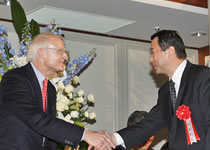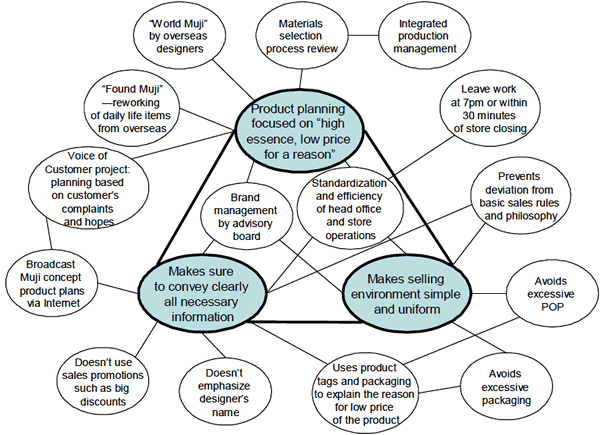Winners / Selection Rationale
Ryohin Keikaku Co., Ltd.
2007 7th Porter Prize Winner Private Branded Product Retail
Achieves full potential of Muji Ryohin value proposition of “high quality, no waste, low price with a reason” by complete control of value chain through company brand-only product planning and distribution (so-called SPA model)
Unique Value Proposition
 Ryohin Keikaku established a unique presence in the world as a lifestyle store. They propose a lifestyle with its MUJI brand products. The lifestyle Ryohin Keikaku proposes centers on the value it places on "substance." Ryohin Keikaku carefully chooses materials, and reviews the manufacturing and delivery processes to eliminate all unnecessary features and excessive packaging from MUJI products. It makes efforts to utilize parts of food items that are overlooked by other producers. It's canned salmon, for example, includes meat taken off the fish skeleton just below the head and above the tail, parts which are usually discarded. This is just one example of care given to the selection of ingredients and materials. It also avoids the use of bright colors. Clothes featuring cotton's natural colors are the result of eliminating the dyeing and bleaching processes. As a result, MUJI products are simple in design, lower priced, but good quality. In many cases, MUJI products are priced 30% lower than the national brands. This product positioning was well expressed by its popular tagline, "low priced for a reason." In a sense, Ryohin Keikaku creates value by eliminating unnecessary extra features, rather than by adding something. A literal translation of the company name Ryohin Keikaku is "planning good products." MUJI is shorthand for Mujirushi Ryohin, which means "no brand, good quality."
Ryohin Keikaku established a unique presence in the world as a lifestyle store. They propose a lifestyle with its MUJI brand products. The lifestyle Ryohin Keikaku proposes centers on the value it places on "substance." Ryohin Keikaku carefully chooses materials, and reviews the manufacturing and delivery processes to eliminate all unnecessary features and excessive packaging from MUJI products. It makes efforts to utilize parts of food items that are overlooked by other producers. It's canned salmon, for example, includes meat taken off the fish skeleton just below the head and above the tail, parts which are usually discarded. This is just one example of care given to the selection of ingredients and materials. It also avoids the use of bright colors. Clothes featuring cotton's natural colors are the result of eliminating the dyeing and bleaching processes. As a result, MUJI products are simple in design, lower priced, but good quality. In many cases, MUJI products are priced 30% lower than the national brands. This product positioning was well expressed by its popular tagline, "low priced for a reason." In a sense, Ryohin Keikaku creates value by eliminating unnecessary extra features, rather than by adding something. A literal translation of the company name Ryohin Keikaku is "planning good products." MUJI is shorthand for Mujirushi Ryohin, which means "no brand, good quality." Ryohin Keikaku changes only 15% of its existing product lineup per year. It believes this provides customers with a sense of reassurance (customers can rest assured that they will always be able to find their favorite products).
Its product lineup is broad, encompassing 7,000 items, ranging from household goods (linens and interior goods, furniture, electronic appliances, houseware items, stationary, health and beauty goods, and outdoor products), and apparel (men's, ladies, and kid's wear, underwear, accessories, bags and shoes), to food items (sweets, processed foods, beverages and chilled foods). All items are intended for use by apartment dwellers living in two- or three-bedroom apartments. The sales breakdown by product line in 2006 was household goods, 55.2%; apparel, 34.8%; and food, 8.6%. Gross profit by product line in 2006 was household goods, 41.6%; apparel, 45.8%; and food, 32.8%.
Unique Value Chain
Technology development
Ryohin Keikaku has an advisory board that consists of outside independent designers. At a once-a-year product planning meeting, members of the advisory board review the product lineup to make sure that all MUJI products meet MUJI's value proposition.
Ryohin Keikaku formed an alliance with Yoji Yamamoto Inc., a design firm led by a famous designer. The aim was to design apparel products that are basic but not unattractive.
Ryohin Keikaku launched its World MUJI and Found MUJI projects in 2003. For the World MUJI project, non-Japanese outside designers to design products that answer the question: "What would MUJI look like if it was in your country?" Several well-known designers from Italy, Germany, and the U.K. provided designs without putting their names on the products. The Found MUJI project consists of finding local products in other countries that fit MUJI's value proposition. These two projects contributed 700 items to the product lineup, and accounted for 20% of total sales in 2006.
Ryohin Keikaku actively seeks feedback from its customers. The staff makes it a practice of regularly communicating to the headquarters any feedback received in stores. It has also developed a community of customers using the Internet, whereby two-way communication is possible. It has 1.8 million members. The company's most successful product resulting from suggestions provided by customers is the "Fit Sofa," which is a soft sofa that in places is hard like a stool. This effect is achieved using two different kinds of cloth, with dissimilar elasticity on the various surfaces of the cubic-shaped sofa. Sales of the Fit Sofa reached 130,000 units, totaling ¥1.5 billion in 2006.
Manufacturing
Ryohin Keikaku does not have its own factories.
Store operation
Ryohin Keikaku cut back on its in-store activities, which are limited to serving customers. The product variety and store layout are standardized. Inventory is replaced automatically. Busy stores receive products that have already been sorted at the distribution center.
Marketing and sales
Ryohin Keikaku explains how it achieved lower prices on its price tags and packaging.
Ryohin Keikaku has several sales channels for MUJI products: MUJI road-side stores (240 stores --172 directly managed stores, and 68 licensed stores), MUJI shops in Seiyu supermarkets (78 stores), MUJI corners in FamilyMart convenience stores, MUJI shops inside train and subway stations, and its own internet store. It also conducts sales through Askul, an office products catalog retailer (Porter Prize winner in 2002). The licensed stores, the shops in Seiyu, the shops at stations, the MUJI corners in FamilyMart use the same store fixtures, and Ryohin Keikaku decides which products each store should carry.
Human resource management
Ryohin Keikaku specifies work procedures for shop employees and managers in a manual called the "MUJIGRAM." Newly hired shop staff will be trained within 7 days, using the "MUJIGRAM for Newcomers." All employees are required to carry a copy of the "Basic Rules of Sales," in which employees find the basic rules concerning sales and customer service.
Ryohin Keikaku has an advisory board that consists of outside independent designers. At a once-a-year product planning meeting, members of the advisory board review the product lineup to make sure that all MUJI products meet MUJI's value proposition.
Ryohin Keikaku formed an alliance with Yoji Yamamoto Inc., a design firm led by a famous designer. The aim was to design apparel products that are basic but not unattractive.
Ryohin Keikaku launched its World MUJI and Found MUJI projects in 2003. For the World MUJI project, non-Japanese outside designers to design products that answer the question: "What would MUJI look like if it was in your country?" Several well-known designers from Italy, Germany, and the U.K. provided designs without putting their names on the products. The Found MUJI project consists of finding local products in other countries that fit MUJI's value proposition. These two projects contributed 700 items to the product lineup, and accounted for 20% of total sales in 2006.
Ryohin Keikaku actively seeks feedback from its customers. The staff makes it a practice of regularly communicating to the headquarters any feedback received in stores. It has also developed a community of customers using the Internet, whereby two-way communication is possible. It has 1.8 million members. The company's most successful product resulting from suggestions provided by customers is the "Fit Sofa," which is a soft sofa that in places is hard like a stool. This effect is achieved using two different kinds of cloth, with dissimilar elasticity on the various surfaces of the cubic-shaped sofa. Sales of the Fit Sofa reached 130,000 units, totaling ¥1.5 billion in 2006.
Manufacturing
Ryohin Keikaku does not have its own factories.
Store operation
Ryohin Keikaku cut back on its in-store activities, which are limited to serving customers. The product variety and store layout are standardized. Inventory is replaced automatically. Busy stores receive products that have already been sorted at the distribution center.
Marketing and sales
Ryohin Keikaku explains how it achieved lower prices on its price tags and packaging.
Ryohin Keikaku has several sales channels for MUJI products: MUJI road-side stores (240 stores --172 directly managed stores, and 68 licensed stores), MUJI shops in Seiyu supermarkets (78 stores), MUJI corners in FamilyMart convenience stores, MUJI shops inside train and subway stations, and its own internet store. It also conducts sales through Askul, an office products catalog retailer (Porter Prize winner in 2002). The licensed stores, the shops in Seiyu, the shops at stations, the MUJI corners in FamilyMart use the same store fixtures, and Ryohin Keikaku decides which products each store should carry.
Human resource management
Ryohin Keikaku specifies work procedures for shop employees and managers in a manual called the "MUJIGRAM." Newly hired shop staff will be trained within 7 days, using the "MUJIGRAM for Newcomers." All employees are required to carry a copy of the "Basic Rules of Sales," in which employees find the basic rules concerning sales and customer service.
Innovations
- Lifestyle store.
- Open innovation system --- World MUJI, Found MUJI, NetCommunity.
Trade-offs
- Does not sell anything that would not be used in daily life by people living in two- or three-bedroom apartments.
- Does not sell products that are not originally designed for MUJI.
- Does not put any brand name on the products, not even the MUJI brand name.
- Does not use bright colors for its products, and eliminates any excess packaging.
- Does not put products in extra packages.
- Does not equip products with additional features or functions beyond the primary feature or function.
- Does not use public figures in advertising. Its products are given the center stage.
- Does not publicize the name of the established designers who participated in product development.
- Sells MUJI products only in an environment in which Ryohin Keikaku can control the store fixtures, the layouts, and product selection.
- Does not use discounting as a tool to attract customers to its stores. For example, a campaign offering items at "half-price to the first five customers" would not be acceptable. Nor does Ryohin Keikaku give huge discount on its products.
Profitability
Return on invested capital (ROIC) (Unit = percentage point)
Return on invested capital = Operating income / Average invested capital
Return on sales (ROS) (Unit = percentage point)
Return on sales =Operating income / Net sales
| Difference from industry averag over 5 year period |
Difference from industry average, by year | ||||
| 2002 | 2003 | 2004 | 2005 | 2006 | |
| 20.1%P | 7.1%P | 17.4%P | 25.9%P | 31%P | 28.2%P |
Return on sales (ROS) (Unit = percentage point)
| Difference from industry average over 5 year period |
Difference from industry average, by year | ||||
| 2002 | 2003 | 2004 | 2005 | 2006 | |
| 3.9%P | 2.9%P | 3.5%P | 3.0%P | 6.7%P | 4.4%P |
Activity System Map

Winners PDF
- 2007 Porter Prize Winners PDF (All of the award company in this year are published. )






